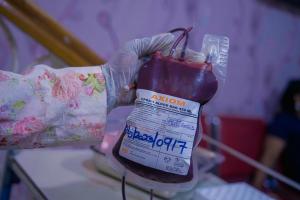Blood donation-a selfless life-saving act.
Abuja, 14 June, 2023 - Donating blood as a voluntary non-remunerated donor is becoming a pastime for 32 years old Charles Obikwelu, who donated for the first time on 15 June 2022 during a blood drive conducted by the World Health Organization (WHO), in partnership with the United Nations Clinic and the National Blood Service Commission(NBSC).
The drive was part of activities commemorating the 2022 World Blood Donor Day.
Since then, he has donated voluntarily three (3) times at the National Blood Bank in Abuja.
Recounting before his first time, Mr Obikwelu says he had always wanted to be a voluntary regular donor but procrastinates due to time and distance to donation centres.
"An act of kindness makes me happy. I have donated three times within the last year. The experience has been incredible, always getting a warm reception from the medical personnel. The only downside is the needle prick, he says.
Mr Obikwelu urged people who are yet to be unpaid voluntary blood donors to support the act saying, "If you can, you should.”
With approximately 200 million people in the country, Nigeria needs estimated 1.8 million units of blood per annum, but voluntary non-remunerated blood donation accounts for only 10% of total blood collection in the country, raising concerns about the safety of blood units collected from commercial and family replacement donors.
Voluntary blood donors are people that donate without incentives. The WHO explains that blood, plasma, and other blood products are essential resources for planned treatment and urgent health interventions.
According to NBSC, Nigeria gets only 27% (500,000 pints) of its annual blood need from voluntary blood donors, leaving a shortfall of about 73.3% of blood need every year.
“Healthy Nigerians need to cultivate the habit of being regular voluntary non-remunerated blood donors as it can help save lives, especially during emergencies, says Faith Ajani, a Medical Laboratory Scientist.
Mr Ajani explains that there is an urgent need to educate Nigerians on the importance of regular voluntary blood donations as it saves more lives when there is the storage of safely screened blood in the blood bank that can easily be accessible by health institutions, patients or during emergencies.
He says this will reduce the frequent call for blood donation during emergencies like accidents, disasters and insecurity attacks.
“Screening of blood to ensure it is safe for use requires a rigorous process as this prevents transmission of diseases such as Hepatitis A.
A regular voluntary donation will allow room for necessary tests and availability of safe blood in the blood banks," he says.
Although there is no national data on blood donated (remunerated or non-remunerated) yearly in Nigeria, the Director-General, of NBSC, Dr Joseph Omale Amedu, agrees with Mr Ajani that the frequent call for blood donation during emergencies is due to the shortage of donated blood in the national blood banks.
Dr Amedu stresses the importance of blood donation and solicits that more people become regular blood donors.
According to WHO, blood and blood products are essential resources for the effective management of women suffering from bleeding associated with pregnancy and childbirth; children suffering from severe anaemia due to malaria and malnutrition, patients with blood and bone marrow disorders, inherited disorders of haemoglobin and immune deficiency conditions; victims of trauma, emergencies, disasters and accidents; and patients undergoing advanced medical and surgical procedures.
However, with blood shortage at the bank, many Nigerians who often need it cannot access it when required.
World Blood Donor Day holds on 14 June every year to raise awareness of the importance of voluntary blood donation as a guide for action towards achieving universal access to safe blood transfusion. It also provides an opportunity to celebrate voluntary blood donors around the world for their gift of blood.
In Nigeria, WHO has been providing support to NBSC in the drive for blood donation through blood drive awareness creation and the reporting of blood safety data in the country.
Furthermore, WHO supported the strengthening of the capacity of seven centres of the National Blood Service Commission (NBSC) for ensuring adequate supply of safe and quality assured blood and blood products for patients who need blood transfusions including COVID-19 patients; through conducting the Africa Society for Blood Transfusion (AfSBT) on-site formal assessment, under the Stepwise Accreditation programme (SWAP).
The NBSC is using the outcome of that assessment to plan for the accreditation of their centres.
Commemorating the 2023 World Blood Donor Day, the WHO Country Representative, Dr Walter Kazadi Mulombo, while acknowledging the strides and effort the NBSC has put into strengthening the blood service, says “There is a need to put in mechanisms to collect more blood in the country including the facilitation of the establishment of new blood centres at the sub-national level”
Celebrating the day gives WHO the opportunity to join the global community to appreciate voluntary blood donors around the world for their gift of blood and highlight the crucial role for action towards achieving universal access to safe blood transfusion.
Technical contacts:
Dr Martin Joseph; Email: mjoseph [at] who.int (mjoseph[at]who[dot]int)
Mr Hamzat Omotayo; Email: hamzato [at] who.int (hamzato[at]who[dot]int)
